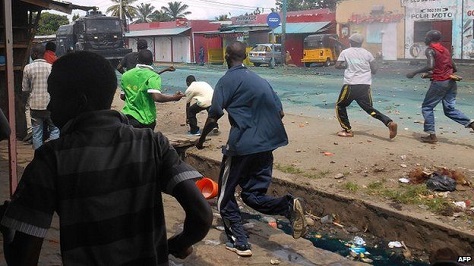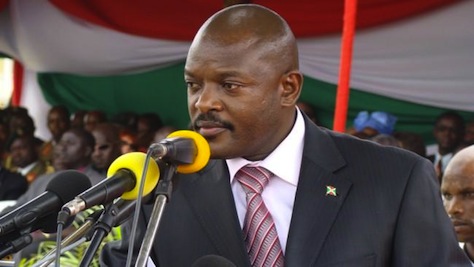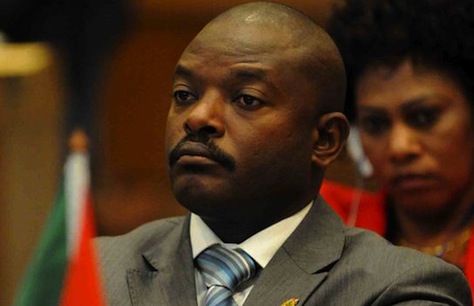 Guest post by Kevin Buettner
Guest post by Kevin Buettner
Though democracy may not yet be entrenched in central Africa, 2015 marks a pivotal step in the history of at least two countries in the region — one that is potentially transitioning from war to democracy and another now in danger of losing its democracy to further civil unrest or even outright war.

The Central African Republic is preparing for presidential and legislative elections in August 2015, which its leaders hope will be a crucial step on the path to peace. Until the end of 2014, the country was in the midst of a brutal civil war that has displaced over a million people. The conflict continues, though the major armed groups have officially disarmed and rebranded themselves into political parties.
The Parti centrafricain pour l’unité et le développement (PCUD, Central African Party for Unity and Development), headed by Patrice Edouard Ngaissona (pictured above), evolved from the anti-Balaka (literally, ‘anti-machete’) armed rebel group that formed in response to the Séléka movement that brought former president Michael Djotodia to power for four brief months at the end of 2013.
The competing Union pour la Paix en Centrafrique (UPC, Union for Peace in the Central African Republic) is the largest of the parties formed from the Séléka alliance. Led by general Ali Djarass, the UPC was the first faction of the Séléka armed groups to disarm and join the transitional government in ceasefire accords needed prior to the elections. Other minor parties, general Joseph Zoundeko’s RPRC (Patriotic Movement for New Central African Republic) and general Nourredine Adam’s Séléka party have also disarmed and joined the political arena ahead of the upcoming elections.
The PCUD, supported by the country’s majority Christian population, is likeliest to succeed in those elections. Whichever party wins, however, the next government will face the immediate and urgent task of repatriating nearly half a million refugees from neighboring states; settling internally displaced citizens; rebuilding schools, hospitals, and other needed infrastructure; and establishing a governmental presence outside of Bangui. There will also be a call from both sides, joined by the international community, to bring perpetrators of atrocities committed during the civil war to justice. Referring cases to the International Criminal Court might be easier than attempting to try the offenders in the CAR, which will remain bitterly divided from the conflict.
Some lessons on how to accomplish the task may be found in Burundi, a country in the great lakes region of Africa, southeast of the Central African Republic. In 2006, Burundi ended a prolonged civil war and held relatively free and fair elections. Though Burundi had a democratically elected leader in Pierre Nkurunziza, its president is now threatening to throw the country into a period of unrest by running for a third term in office. His refusal to step down after his second term and the anticipated amending of the constitution to allow for further presidential reelection has discouraged engagement by opposition parties within Burundi.
* * * * *
RELATED: As world remembers Rwanda genocide,
Burundi tilts into political crisis
* * * * *
The only semi-organized opposition to the ruling Conseil National Pour la Défense de la Démocratie–Forces pour la Défense de la Démocratie (CNDD-FDD, National Council for the Defense of Democracy–Forces for the Defense of Democracy) is the Alliance of Democrats for Change (ADC-IKIBIRI), which represents a merger of most of the remaining opposition parties from the prior 2010 elections. The alliance, however, has not solidified behind a single candidate to challenge the incumbent. With elections to be held in June, their time to mount an effective campaign may have already run out.
International money is flowing into both countries ahead of the elections in order to establish necessary voting infrastructure. CAR has received nearly $22 million and Burundi received $9.2 million from the European Union alone. For the elections in Burundi or CAR to be considered successful by the international community, the opposition must remain engaged in the political process and put forth viable candidates. These candidates, ideally, are not figures likely to become subjects of future ICC indictments (especially in CAR), which would serve to detract from the situations at hand.
Peace in both countries is expected to remain extremely fragile in the months leading up to the elections. To reduce the chances that the losing party will rearm and try to take power by force, power-sharing agreements may be necessary. Such arrangements are facilitated in the Burundian constitution through the mechanism of electing two vice presidents, one from each of the major Hutu and Tutsi ethnic groups. Perhaps the best-case scenario for both countries would be a small majority of votes going to the ruling (or in the case of CAR, the larger PCUD party). Having a narrow mandate would force the ruling party to collaborate more often with the opposition, allowing them more legitimacy, in turn, for future elections.
Kevin Buettner is a graduate student from The Ohio State University studying City and Regional Planning with an interest in international development.
![]()
![]()





